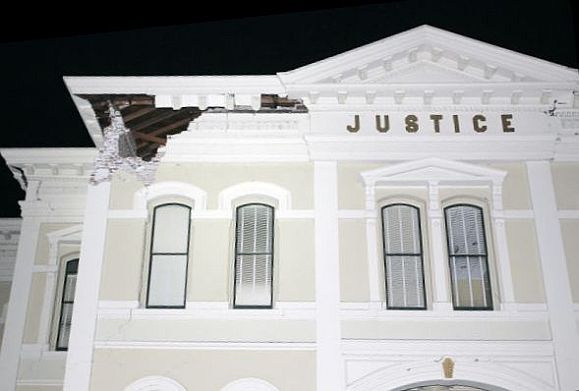|
 Napa
County Courthouse,
Napa,
California, USA - 3:20am Sunday August 24, 2014
Napa
County Courthouse,
Napa,
California, USA - 3:20am Sunday August 24, 2014
|
|
This morning's Richter scale 6.0 earthquake in the
Napa Valley
where I live, was not the first earthquake I've experienced
up close.
It wasn't even the first earthquake greater than a 5.5 I've
experienced. One of those, the 6.9 Loma Prieta temblor
of 1989 which broke the back of the Bay Bridge, was
way stronger. And it affected a much, much wider area.
Aside from sheer
power,
there's an obvious and essential difference between a hurricane and
an earthquake: whereas a hurricane builds slowly and visibly and
comes on gradually, an earthquake comes on suddenly, unseen, and
without any warning. It's a shock. With a hurricane, should you
choose to heed the warning, you can move out of its way (in
Fiji
I chose not to). With an earthquake, by the time you get the
warning, it's already too late.
It
woke
me out of a peaceful
sleep
at 3:20am, coming on like a wild bouncing Mack truck with shot
suspension and no muffler, having missed its freeway onramp and was
instead barreling through the
Cowboy Cottage.
It's both terrifying and
marvelous
simultaneously.
It seemed endless, going on ... and on ... and on. In less than its
first split second, I could tell it would hurt people, my
friends,
my town's folk. Finally its violence stopped. The dead quiet of the
night had returned. I noticed
my heart
was pounding. I became aware of the crickets chirping in harmony
out in the cattle pasture. They didn't seem too bothered by it.
I got up (the bed had stopped shaking) and checked around. It was
becoming imminently clear the house was spared. There were no signs
(miraculous?)
of damage in or around the place. Electricity was off but quickly
came on again. Gas was fine. Water was still on.
Internet
was connected. There were no cracks in the walls. A few hanging
pictures
were atilt - but only slightly. I adjusted them with a spirit
level. All windows and door sliders moved smoothly (that's a very
good sign). Noticing his flashlight beam moving outside, I called
out to my neighbor, asking if he was OK. He was. The worst for him
was one of his pets bolted in fright, and was nowhere to be found.
In the distance, we heard sirens. Back inside, I found some bottles
fallen in my kitchen cabinet. None had broken. I stood them up,
then went back to
sleep.
|

